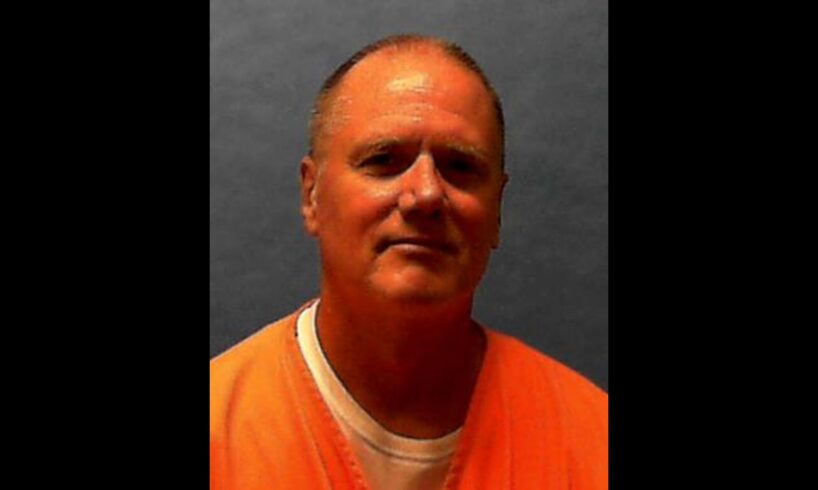
Florida carried out its ninth execution of 2025 on Thursday, July 31, putting Edward J. Zakrzewski to death by lethal injection at Florida State Prison, near Starke. Florida has executed one-third of the 27 executions carried out in the US so far this year. There were 25 executions in the country in all of 2024.
Edward J. Zakrzewski
Zakrzewski, 60, was sentenced to death for the 1994 slayings of his Korean-born wife, Sylvia, 34, and their two young children, Edward, 7, and Anna, 5, at their home in Okaloosa County. Trial testimony revealed he committed these murders after his wife sought a divorce, using a crowbar, rope and machete in a brutal attack. He pleaded guilty to the murders in 1996.
The condemned inmate’s final words indicate he had little grasp of reality or understanding of his impending punishment. He bizarrely thanked “the good people of the Sunshine state for killing me in the most cold, calculated, clean, humane, efficient way possible,” adding, “I have no complaint.” He was pronounced dead at 6:12 p.m. local time.
Zakrzewski’s execution proceeded despite a last-ditch appeal for a stay was rejected by the US Supreme Court on Wednesday. He was sentenced to death by a non-unanimous jury, which voted 7-5 to recommend a death sentence for the killing of his wife and son, and deadlocked 6-6 to recommend death for his daughter’s murder. The 7-5 bare majority vote would not have been sufficient under Florida’s current law for a death sentence. However, due to a reactionary 2021 US Supreme Court ruling, the current law is not retroactive in the cases of Zakrzewski or other death row inmates.
Before 2014, Florida allowed judges wide discretion in death penalty sentencing, with juries making only non-binding, advisory recommendations. Following the US Supreme Court’s 2016 decision in Hurst v. Florida, which ruled that the state’s capital sentencing statute was unconstitutional because it allowed judges to have the final say in handing out death sentences, Florida amended its law to require a 10-2 jury vote to impose a death sentence. The state Supreme Court ruled this amended law unconstitutional, prompting the state to change its law to require a unanimous jury vote.
Central to the controversy surrounding Zakrzewski’s sentence and Florida’s death penalty practices is the state’s recent change to its jury recommendation requirement. Governor Ron DeSantis signed a bill on April 20, 2023, that reduces the number of jurors needed to recommend a death sentence from 12 to 8, making Florida’s threshold among the lowest of any state with capital punishment. This change is clearly unconstitutional.
DeSantis seized on the public outrage over the 2018 Parkland school shooting, which left 17 dead, to push through the change in the law. Nikolas Cruz, the Parkland shooter, was sentenced in 2022 to life in prison without the possibility of parole after three jurors voted against imposing a death sentence. Florida is now one of only two states (the other being Alabama) where unanimous jury recommendations are not required for death sentences.
It is also clear that Florida law at the time requiring a unanimous jury vote for a death sentence had nothing to do with Cruz carrying out the Parkland mass killings, as he had multiple diagnoses of mental illness and developmental issues recognized before the shooting. The furor whipped up over the failure to sentence Cruz to death is another case in which ultra-right proponents of execution utilize horrific crimes to support their agenda, when more complex social forces—poverty, mental illness, police violence, a ruling class hell bent on war—are often at work.
Florida, under DeSantis, is rapidly escalating its use of capital punishment, setting an unprecedented pace that has seen it carry out more executions than any other US state this year. This aggressive push has been encouraged by President Donald Trump’s sweeping executive order, signed on his first day of his second term in office, which calls for a dramatic expansion of the death penalty and urges prosecutors to seek capital punishment for severe crimes, particularly those involving law enforcement officers or undocumented immigrants.
The state’s actions are widely condemned by human rights advocates and faith leaders. Over 100 faith leaders urged DeSantis to halt Florida’s rapid pace of executions, emphasizing that the state’s death penalty system “is plagued by racial disparities, a long and painful process that retraumatizes families, and a troubling history of wrongful convictions.” Florida already leads the nation in death row exonerations, with 30 individuals freed since 1973—a stark indication that innocent individuals have already been sent to their deaths.
In 2020, the US Supreme Court ruled in Ramos v. Louisiana that the Sixth Amendment requires a unanimous jury for convictions and sentences for serious offenses in both federal and state courts. However, the Court ruled in 2021 in Edwards v. Vannoy that the Ramos decision does not apply retroactively to cases on federal collateral review.
This effectively means that individuals such as an African American, whose sole black juror voted to acquit him of multiple serious crimes, including armed robbery and kidnapping, but was overridden by other jurors, are barred from seeking relief in federal court even if his conviction was unconstitutional under the Ramos ruling.
Adding another layer of controversy to Zakrzewski’s case was the prosecution’s use of the writings of 19th century German philosopher Friedrich Nietzsche—a foul opponent of socialism and egalitarianism—during his trial. To counter the defense’s attempt to present Zakrzewski as having embraced Christianity and showing remorse post-offense as a mitigating factor, the prosecution introduced Zakrzewski’s personal writings and notes that referenced Nietzsche.
Despite defense objections, the judge allowed a psychologist to testify about Nietzsche’s criticisms of Christianity, and Zakrzewski’s notes quoting Nietzsche were admitted as evidence. The prosecution aimed to portray Zakrzewski as influenced by Nietzsche’s anti-Christian views, emphasizing statements that critiqued Christian notions of forgiveness and propagated fear of eternal damnation. Zakrzewski’s supposed anti-Christian views were used by the prosecutors to cast him as a heretic. This was intended to undermine the defense’s narrative of their client’s religious remorse, which successfully persuaded the jury to recommend a death sentence.
In addition to the nine executions in Florida, state killings so far this year have included four in Texas, four in South Carolina, three in Alabama, two in Oklahoma, and one each in Arizona, Indiana, Louisiana, Mississippi and Tennessee.
Florida is currently scheduled to send two more individuals to their deaths this year: Kayle Barrington Bates on August 19, and Curtis Windom on August 28. Two executions are planned in Texas, two in Tennessee, and one each in Utah, Alabama, Indiana and Missouri, putting the US on track to execute 37 people in 2025.
Sign up for the WSWS email newsletter





